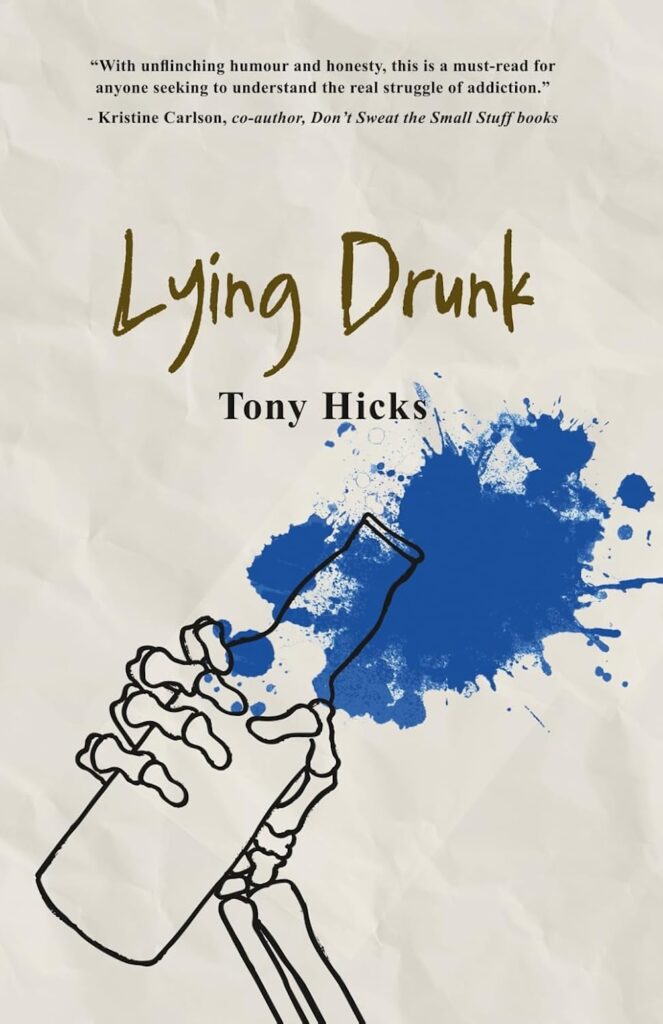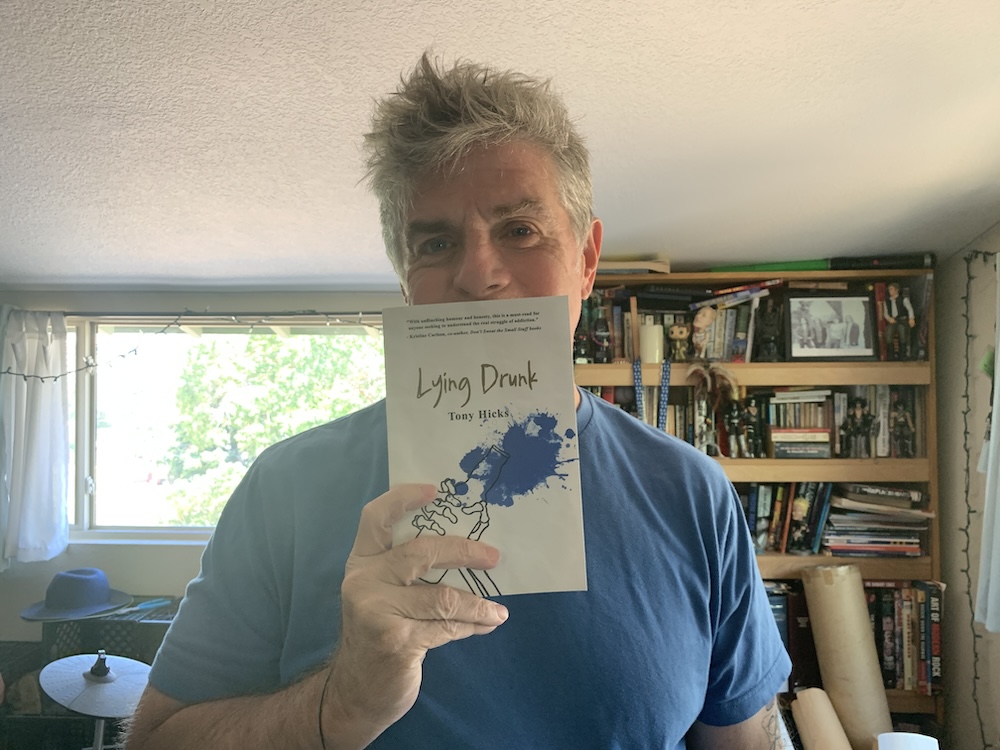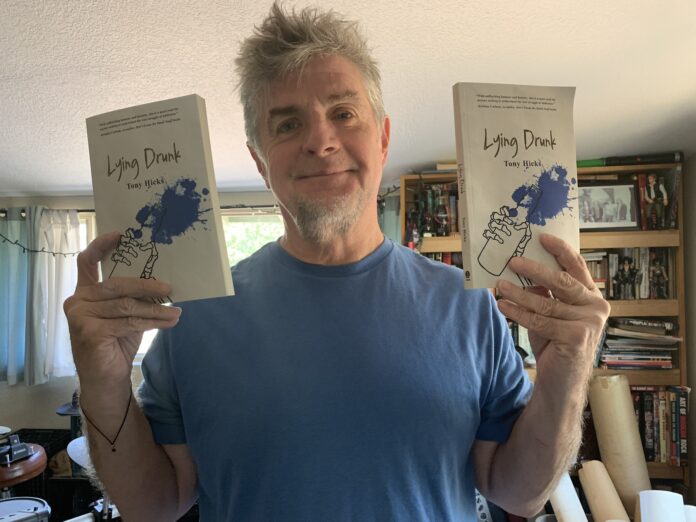In his debut book Lying Drunk, longtime journalist and opinion columnist Tony Hicks tells the searing, tragic story of his addiction to alcohol. It chronicles a decades-long journey and the monstrous lies he told to everyone in his life, and which formed the bedrock of his life. The anchor of alcoholism, even during his current sobriety, is portrayed as the weight he carries daily.
In the 12 chapters and a prologue of the 207-page book, released in June, Hicks lays out a multitude of truths that lurk behind an alcoholic’s supersized destructive behavior. Among them are the yin and yang of how alcohol makes a person with an addiction feel, the hard work it takes to be an alcoholic, and the ease with which one can fall off—or leap from—the sobriety wagon. Above all, the book speaks of devastation: Hicks knows the insurmountable pain he has inflicted on family members and relationships.
Remarkably, the author’s signature humor—satirical at times, lighthearted at others—prevails in the exact proportion necessary to prevent his story from becoming all sturm und drag. Laughter is his innate, long-practiced PPE (personal protective equipment) and works as the swift breeze that carries a reader through each story he tells.

In an interview from his home in Walnut Creek, Hicks says, “Humor’s always been my tool, since I was a kid. Who wants to read a super-serious book telling people what they need to do? This isn’t a self-help book. I do have underlying points, but some of the best points on the planet are made through humor. It’s a comfortable way for a reader to get into your story, warm up to you, and feel like you and the material are approachable. I’ve always used humor to get closer to people, make girls like me, to seem smart, whatever. That was my strategy early on.”
Most of his favorite writers are funny, including columnist Dave Barry and writers Hunter S. Thompson and Charles Bukowski. “Dave Eggers’s Pulitzer (finalist) memoir (A Heartbreaking Work of Staggering Genius) was a remarkable book. He’s very funny. Back in college, most of my favorites were alcoholics and I figured, guess I’m gonna be one of those drunk writers. It worked for them.”
Hicks writes that his drinking habit began in high school and caused a majority of people signing his yearbook to exclaim about how much he could take down—but that was just the beginning. The grip of his addiction was at first restricted to nighttime hours. That meant he could still work full time as an award-wining columnist, reviewer, and reporter for 23 years with the Bay Area News Group papers. By the 2010s, day drinking would become his norm. “I was drinking out of necessity. It was like the air I needed to breathe just to feel normal. It got to the point where I realized the hangover and fuzzy headedness would go away if I started drinking in the morning. My life got more tenuous as time went on. I was white-knuckling my job.”
By 2017, he had blown the fuse box. “I got angry and quit my job even though I should have been fired years before. Within the same month, I had split from my wife at the time [in the book Hicks names his two former wives X1 and X2]. I disappeared from my friends for a decade. I was semi-homeless, had broken out of rehab. One weekend I was in a psych ward one night, in jail the next night, and some night I slept on a park bench in Martinez, wearing a t-shirt and shorts in January.”
With his functionality shredded and life in fragments, alcohol remained the toxic glue that for decades, he writes, made him feel “light, magical, and wise.” He says his mind told him he was paid to have and express opinions as a columnist and film and music critic. Drinking loosened his tongue and made him a better writer, or so he told himself. Thinking back to his teen years, he says, “Having a big sense of humor makes up for not being the best looking, the smartest. It takes away the anxiety, and boy, if you put alcohol into the situation and let that humor go? Getting that attention, working up the courage to do things I did required alcohol. I had the best time; before it became a real hindrance.”
Along his pothole-filled road to sobriety, Hicks learned what it was like to be homeless. “I had built up this career, grew up in Walnut Creek and San Ramon. I couldn’t be homeless. And then, yeah, I was homeless for a while. It was a monstrous slap in the face. This can happen to anyone. You can go downhill really fast.”
He admits that it took him until his third stint in rehab to use the word alcoholic. “It’s like these people are not fit for society but in reality, they’re a big part of society,” he writes of those grouped under the term. “They’re regular people, not to be demonized. Any addiction is so strong, it’s like oxygen. There’s a perception in your brain that you can’t live without it.”
Most people expect recovery to be difficult, but Hicks failed to recognize or examine how very hard it was to sustain his addiction.
“From the time you get up in the morning, you’re gauging what you did the night before by the reactions of your family. You manage your schedule around alcohol. How and when am I gonna need it? Where will I put it after I get it? Where will I put those empty bottles? Not in the garbage or they’ll pile up. A lot of stupid little details that take on significance when you’re in addiction.”
In the book, his hard work extends to avoiding the police, jail, and homeless shelters. The pressure of skirting street conflicts that are often violent and include theft makes it impossible to ever feel safe. Strategizing how to sneak alcohol demands energy draining efforts. Hick’s humor mingles with pain in his description of one family ice cream outing. He placed an order, dashed out to the nearby CVS under some ruse, bought and chugged down a large dose of alcohol, and was back in time for cones and conversation. The funny-tragic tales wired together leave a reader to a kind of happy-sad crying.
Even after getting sober, Hicks’ most difficult lessons are raw enough to threaten his fragile recovery. These include new depths of understanding about taking responsibility for the emotional pain he has caused to loved ones, particularly his two daughters. Olivia is 23; she and 17-year-old Lucy currently live with their father.
“I didn’t meet my dad until I was 18,” writes Hicks. “His family was full of alcoholics just like the family I grew up in. The biological thing, they’ve found certain people have higher alcohol tolerance. When I was 18, I said with pride and say with no pride now, I could drink more than anybody I’ve ever met. On my 50th birthday, I went to the hospital with a blood alcohol of 0.56. When you’re at 0.3, that’s when people start dying.”
Later, Hicks admits he has abandonment issues, but says, “I don’t want to beat to death the whole ‘my dad wasn’t around so I [expletive] up.’ I take responsibility. I chose to drink. I spent time with that and the choice is taking that first drink. It flips a switch in my brain. My body screams for it. Genetically, I could outdrink everybody, but alcohol also made me feel invincible. I’d feel better than I’d ever felt in my life. That was the case for 25 years… until I was day drinking and had to drink just to get back to normal.”

Did writing the book achieve the purposes he lays out in the book’s early chapters? Does telling the truth balance the scales weighted heavily with lies and deception?
“When I started writing, I was motivated by honesty,” he tells the reader. “It’s not only the drinking that hurts people around you, it’s the lying. After two-and-a-half-years of sobriety, I was done writing it. Writing the book was me, attending to my addiction. Maybe I got too confident, but I decided I could do this (controlled drinking) again.”
The bumpy process he and his daughters went through last year cemented his awareness that recovery requires daily vigilance. “People believe once you get sober the clock is reset. It’s not true. When you start drinking again, within two to three days you’re back where you left off. You’re back in the worst hole you ever dug for yourself.”
Hicks never feels entirely safe, is constantly aware of how he might hurt his kids. “Alcoholism is a living thing. It’s everywhere around me. Once in a while, it pops into my head: oh, I’d love a drink,” he writes. In the prologue of Lying Drunk, Hicks writes that helping someone “avoid the embarrassing molten hellscape of alcoholism”—offering the people around that person better understanding of addiction while simultaneously blasting his past lies with a power wash of stark truth, and using humor to serve it all up—results in a win-win.
As a first-time book author, he grapples with the realities of today’s literary distribution marketplace. On his Substack, Hicks expresses mixed thoughts that the best distributor for a self-published book is Amazon and might mean “a couple more dollars going toward Jeff Bezos’ quest for a fourth elevator in his third mansion.”
In an email to 48hills, Hicks writes, “I wish I had a big deal with a publisher that distributed it (which would almost certainly include Amazon as well). I think reiterating my [Substack] joke is valid, because I said it. And it was a joke. But I could also say Amazon is a very streamlined and easy process for self/hybrid publishing. Otherwise, I’d spend four hours a night packaging and shipping books that I have to store in my home.”
Instead, Hicks focuses on sobriety, building relationships with his daughters based on truth, and working with tremendous appreciation for his revived career as a reporter for Bay City News/Local News Matters and freelancer with Riff magazine. Eventually, he hopes to write books number two, three, four. “Book writing kept me out of trouble the first time I did it, so it’s a good way to keep me out of trouble now.”
Buy Lying Drunk here.






